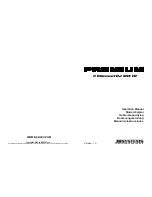
HISTOGRAM with
TAIL-FIT
TM
enabled
To Measure:
For more
information on this
tool, refer to:
Histogram Quick
Reference Guide
available at
www.wavecrest.com
Use Tail-Fit
TM
to separate RJ and DJ. Predict Total Jitter (TJ) at a
specific Bit Error Rate (BER) or amount of time
•
Press the Tail-Fit button. This will open the Tail-Fit menu
•
Under the Tail-Fit selection, change “off” to “Enabled”.
•
Press Clear to clear your measurements.
•
Press RUN. The measurement will stop when the tail regions can be fit. Additional
information can now be displayed.
Figure 3 - Results of Histogram with Tail-Fit™ enabled. Measurement is on
a 2GHz clock
•
Add a view by pressing ADD VIEW on the front panel or press
on the top menu bar.
Change this view to “bathtub” to display the bathtub curve.
We can now see additional values in Figure 3 summary view at the top (which were not
available in Figure 2). The first value is Total Jitter (TJ), which includes contributions
from all deterministic and random components, and is a pk-pk value specified for a Bit
Error Rate (BER), or amount of time. The Bathtub curve shows the TJ as a function of
BER or time. To predict TJ, we must measure DJ and RJ accurately. Random jitter (RJ)
is characterized by a Gaussian distribution and assumed to be unbounded. As a result, it
generally affects long-term device stability. Because RJ is Gaussian in nature, the
distribution is quantified by the standard deviation (1
σ
) and mean (µ). Because RJ can
be modeled as a Gaussian distribution, it can be used to predict pk-pk jitter as a function
of BER or time. The Tail-Fit
TM
algorithm curve fits a Gaussian model independently to the
right and left sides of the distribution. The Values of DJ, LtRMS (left-tail RJ), and RtRMS
(right-tail RJ) are displayed below the TJ. Chi-squared values are also displayed as an
indication of the goodness of fit from model to acquired measurements. Once DJ has
been found, we can determine the causes.
Clock Tools Overview
Page 4 of 13
Содержание SIA-3000
Страница 2: ...This page intentionally left blank...
Страница 4: ...This page intentionally left blank...
Страница 6: ...This page intentionally left blank vi...






































